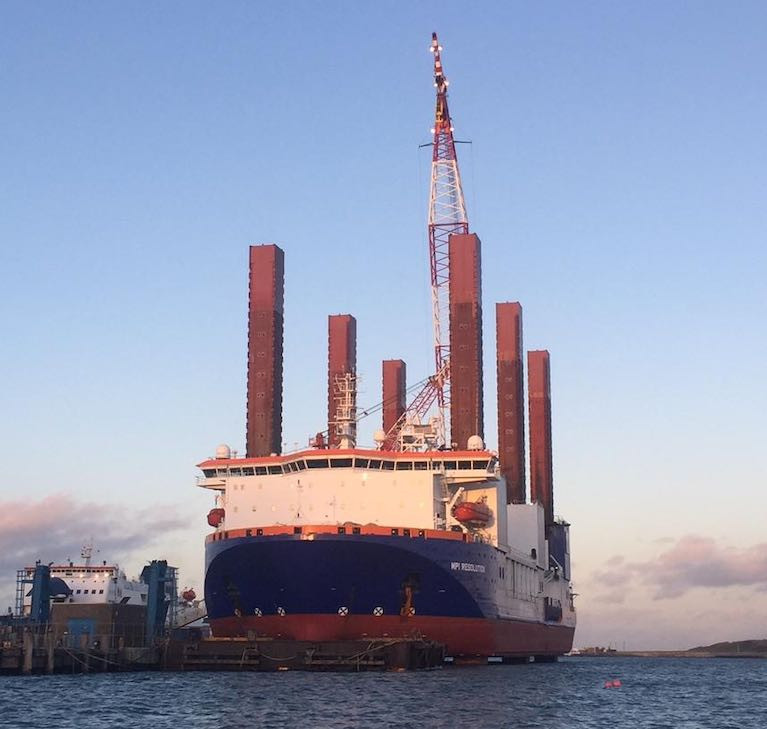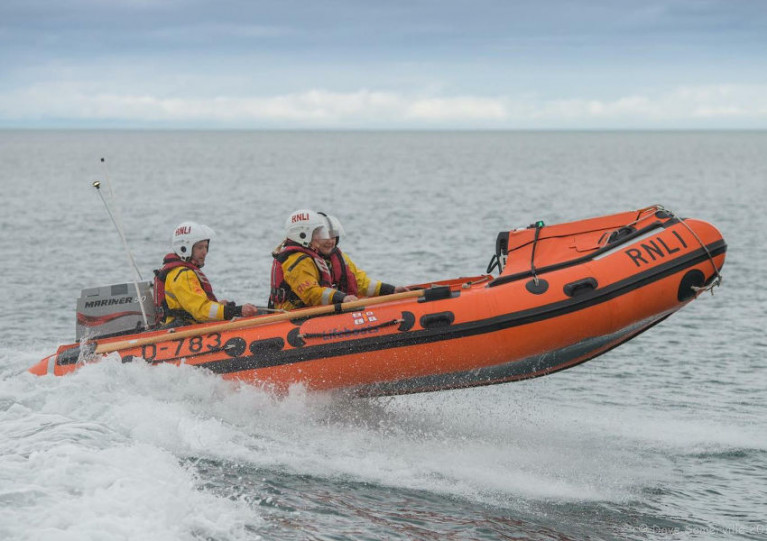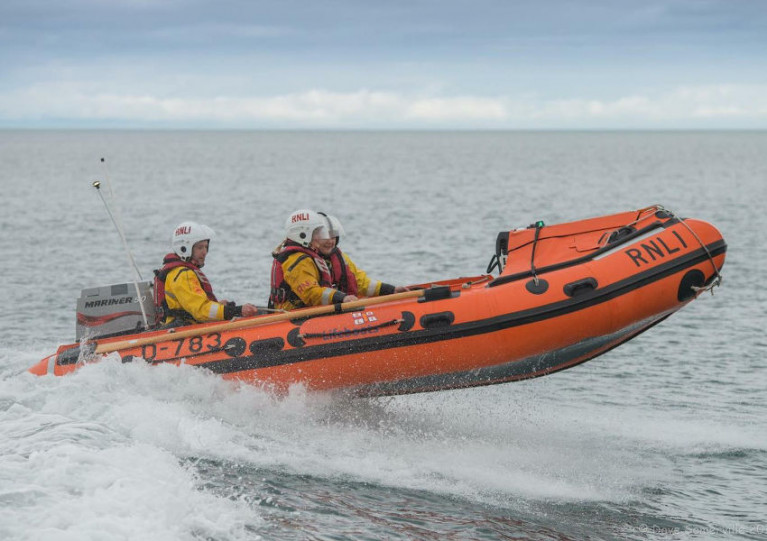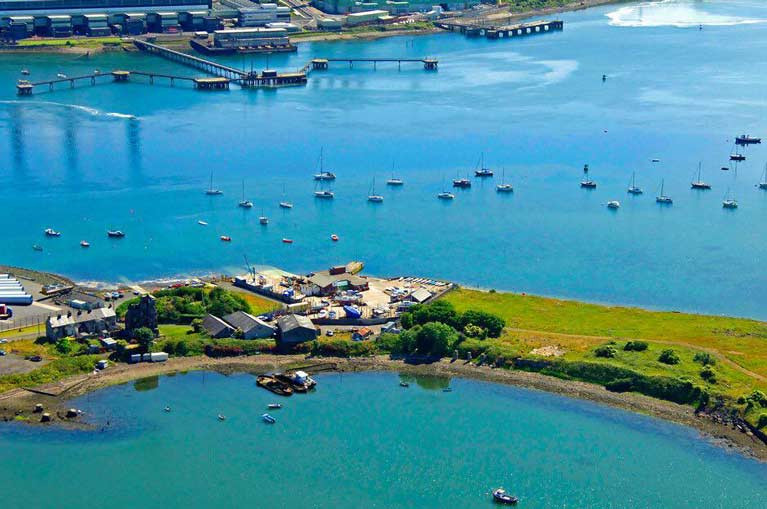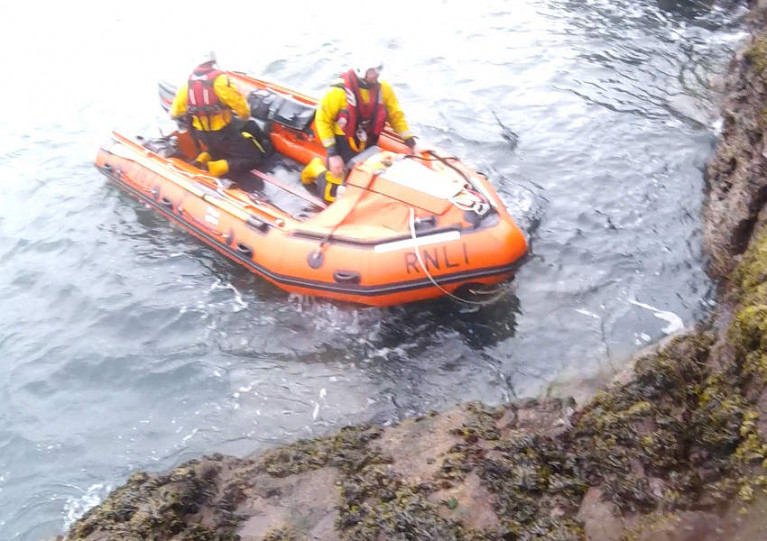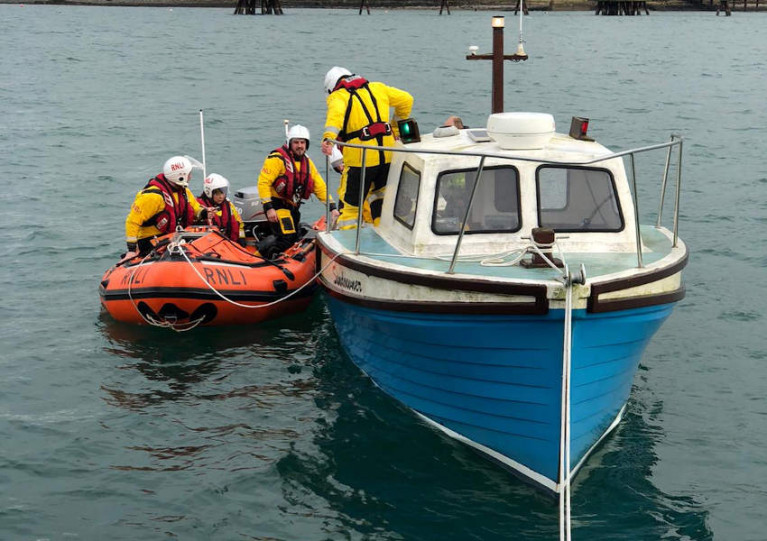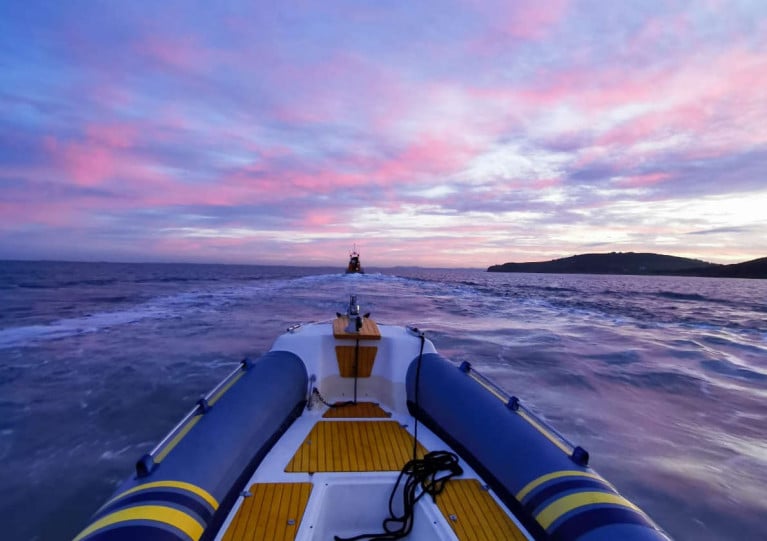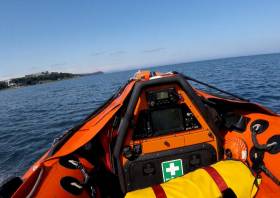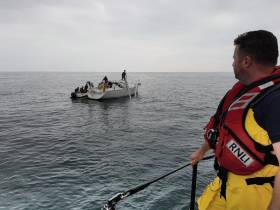Displaying items by tag: Larne
Larne Harbour is Base for 'MPI Resolution', World's First Purpose-Built Vessel for Offshore Wind Turbine Installation
Larne Harbour on the east coast of Antrim in Northern Ireland is currently the base for the MPI Resolution, the world's first purpose-built vessel for installing offshore wind turbines, foundations, and transition pieces.
The ship is working out of Larne to provide Operations and Maintenance services to the UK west coast wind farms and has been using Larne as the base port for these operations.
The 2003-built vessel is 130 metres in length overall and has a 38-metre beam.
Larne Lifeboat Rescues Three After RIB Breakdown
Two adults and a child were rescued this morning (Sunday 9 August) by Larne RNLI after their small RIB broke down near Magheramore in Co Antrim.
The volunteer crew launched the smaller in-shore lifeboat, Terry, at 11.05am and made their way in calm seas towards the scene.
All three on the casualty vessel were found to be safe and well, and a tow was establish to return the RIB to the harbour at Ballylumford.
Inshore lifeboat helm Chris Dorman said: “The casualties did the right thing. They were trying out this piece of equipment and realised that something wasn’t quite right with it, so they contacted the coastguard for assistance.
“Everyone onboard was wearing a lifejacket and they had means to contact the shore in case of emergency.”
He added: “If you see anyone in difficulties at sea, the dial 999 or 112 and ask for the coastguard.”
Larne Lifeboat Launches To Jet Skier In Difficulty
Larne RNLI rescued a jet skier who had fallen into the water off the Co Antrim coast and couldn’t get back onto his craft.
The volunteer crew launched the in-shore lifeboat Terry just after 8pm on Tuesday evening and reached the casualty just north of Tweeds Port slipway within minutes.
The man, who had been in the water for 30 minutes, was recovered into the lifeboat and checked to make sure he wasn’t suffering from his time in the water.
He was then brought back to shore at Tweeds Port and handed over to the care of the NI Ambulance Service. The lifeboat crew then returned to the water to recover the jet ski.
Philip Ford-Hutchinson, Larne RNLI’s deputy launching authority, said: “The casualty was lucky as cold water shock can set in when you are submerged for any amount of time and in any season. Please, when using the water, respect the water.”
Elsewhere, Skerries RNLI had a busy start to the week as they responded to two separate callouts within two hours.
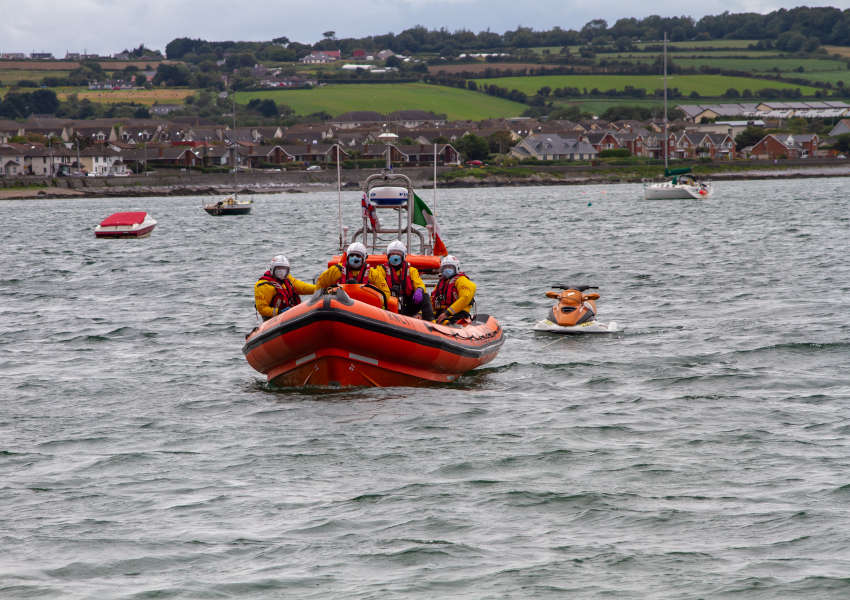 Skerries RNLI towing a broken-down jet ski ashore | RNLI/Gerry Canning
Skerries RNLI towing a broken-down jet ski ashore | RNLI/Gerry Canning
The lifeboat first launched on Sunday (26 July) shortly after 2pm to return two men on a jet ski safely back to shore after they suffered mechanical difficulties off Colt Island.
Then just two hours later the volunteers were called upon alongside the Irish Coast Guard helicopter Rescue 116 and Skerries coastguard unit to carry out a search for a swimmer in distress in the same area, between Colt Island and St Patrick’s Island.
Following a thorough search, and the crew speaking to numerous kayakers in the area, Dublin Coast Guard was satisfied that it was a false alarm with good intent and the helicopter and lifeboat were stood down.
Speaking later, volunteer lifeboat press officer Gerry Canning said: “It’s days like this that you really see the dedication of our volunteer crews.
“Some of them were still on the harbour following the first call out when their pagers sounded the second time. This meant that we could launch quite quickly to what was potentially a serious incident. Thankfully in both cases it was a good outcome.”
Members of the Larne club will welcome its General Committee’s decision to make the most of the lockdown easing, for hot on the heels of RYA NI advice that Step 2 of the Northern Ireland Executive’s Pathway to Recovery has now been reached, dinghy racing will re-start. Although indoor restrictions remain in place, groups of up to 10 people are now allowed to meet outdoors.
The RYA Volvo champion club was established in 1950 on Larne Lough and has been associated principally with the GP14 class. Among the well-known sailors in that class were Johnny McWilliam, Curly Morris, Paul Rowan, Tom Jobling and the Fekkes brothers. Mirrors and Optimists were popular with the young sailors and now the up and coming helms sail Lasers and Toppers. There is a cruiser-racer fleet as well, moored in the shelter lough just off the club.
The plan is to begin a new series on the first Sunday in July. Today (21st June) and the following Sunday (28th June) will be used as trial races to work through any issues that may arise.
Guidelines will include the size of groups starting at different times, ie juniors and adults, and double and single handers, with each start limited to no more than 10 competitors.
If more than 10 people wish to take part, priority will be given to those who have been involved in the most Sunday races in the last 12 months. Changing rooms will remain closed and competitors will arrive in their sailing gear or get changed in the yard if they are comfortable doing so.
The slipway will be split in two to allow for the use of both the dinghy and keelboat slipways simultaneously and there will be committee boat starts with safety boats manned by members of the same household where possible.
Racing will not take place if the Race Officer deems the conditions to be Inappropriate and competitors are urged to be more thorough in pre-race checks of their equipment to reduce the risk of failure.
The Committee stresses that Covid-19 is still a very real threat and says “We are far from returning to normal. We are fortunate in that dinghy racing is an outdoor activity that is socially distant by nature. We would ask that all members respect the measures in place which will hopefully mean that we can continue with an official series in July. The onus is on each of us as individuals to ensure that this is possible”. The Procedures and Risk Assessment are here
Larne RNLI searched for a dog today (Thursday 9 April) when it was reported missing after falling over a cliff near Muck Island, close to Islandmagee in Co Antrim, Northern Ireland.
The volunteer lifeboat crew were requested to launch by Belfast Coastguard to search the area north of the Gobbins cliffs.
The inshore lifeboat, Terry, under helm Dave Sommerville and two other crew members, launched at 9.39am and made their way to the requested search area.
Weather conditions were favourable with a calm sea and good visibility.
The Portmuck mobile coastguard team were searching from the top of the cliffs but were unable to get a clear view of the rocks nearer the water.
A volunteer crew member was put onto these rocks, where it was safe to do so, in order to conduct a search of the area. In places it was not possible to put a crew member onto the rocks, so a shoreline search was conducted.
After searching roughly one mile north and south of the location, the decision was made to stand down by the coastguard as nothing had been sighted.
Speaking following the callout, Larne deputy launching authority Philip Ford-Hutchinson said: “The concern always for a callout of this nature is that owners will try and rescue their pets themselves and in turn get into difficulty and get hurt.
“With the current Covid-19 pandemic, we would urge people who live near the coast and wish to exercise there to be cautious and watch their footing.
“Our lifeboat remains on call and operational, but our lifeboat crew are not training with the current restrictions and the station remains closed to visitors.
“Therefore, we would advise people to stay away from the water and carry out the Government’s advice.”
Larne Lifeboat Assists Broken Down Motor Boat Near Ballygally
Larne RNLI’s volunteers diverted from their crew assessments on Sunday morning (2 February) to assist a person on a nine-metre motor boat which had broken down near Ballygally in Co Antrim.
Launching at around 10.15am into a calm sea, the all-weather lifeboat Dr John McSparran made its way to the casualty boat where a volunteer crew member was put aboard to assess its pilot, who was safe and well.
A tow line was then established so that the casualty boat could be towed into East Antrim Boat Club to be put onto a mooring.
Larne’s inshore lifeboat Terry met the casualty vessel in Larne Harbour, where the tow line was passed across and an alongside tow was carried out to allow the casualty to tie up on its mooring at the boat club.
Speaking following the callout, Larne RNLI lifeboat operations manager Allen Dorman said: “We had a good turnout from our crew today as we had been planning to do some assessments, but it was great to see how the crew reacted when the call came in.
“Everyone knew what they had to do and acted accordingly and were delighted to help the vessel's owner. I’m also pleased to say that the assessments were carried out after the call out and everyone passed.”
Larne RNLI coxswain Frank Healy added: “I was pleased to see the casualty was wearing appropriate safety equipment when we arrived and would like to remind anyone thinking of going onto the water to check that their boat is fully operational and that they have appropriate safety equipment onboard.
“If you do get into trouble at sea remember to call 999 or 112 and ask for the coastguard.”
Larne Lifeboat Assists Three On RIB With Engine Problems
Larne RNLI launched at 3.50pm on Saturday (18 January) to assist a RIB which had lost engine power half a mile south of Muck Island.
The volunteer crew were requested to launch by Belfast Coastguard to the nine-metre RIB with three people on board which had been losing engine power.
The all-weather lifeboat, Dr John McSparran, launched into a slight swell with light levels decreasing as the night closed in.
The lifeboat reached the anchored casualty boat and a volunteer crew member was put on board to establish a tow rope so that the lifeboat could bring the casualty boat into Carrickfergus Harbour.
One of the casualties from the boat was transferred to the lifeboat for some respite from the cold conditions of the open water.
Upon reaching Carrickfergus, the casualty boat was handed into the care of the Portmuck Coastguard team.
Larne RNLI lifeboat operations manager Allan Dorman said: “The casualty boat did the right thing by dropping their anchor and calling for help at the earliest opportunity.
“Being able to find the boat in daylight made it much easier for our volunteer crew to establish the tow and bring them into the safety of Carrickfergus Harbour.”
Monika Dukarska Shines at Irish Offshore Championships
#Rowing: Ireland international Monika Dukarska won in the women’s single, double and coxed quadruple for Killorglin at the Irish Offshore Rowing Championships in Ballygally, Larne, on Saturday. Rough weather in the morning forced the organisers to alter the course. The men’s coxed quad was won by a composite crew which featured Niall O’Toole. Patrick Boomer of Loughros Point won the men’s single.
Irish Offshore Championships, Saturday, Ballygally, Larne (Selected Results; winners)
Men
Quadruple, coxed: Wicklow, Killurin, Ring 16 min 54 sec.
Double: UL Tyrian 19:41.
Single: Loughros Point (P Boomer) 20:27.
Women
Quadruple, coxed: Killorglin 19:05.
Double: Killorglin A (M Dukarska, R O’Donoghue) 19:50.
Single: Killorglin (M Dukarska) 20:39.
Mixed
Double: Arklow A 20:17.
Busy Bank Holiday For NI Lifeboats In Larne & Portaferry
Larne RNLI’s volunteer crew were kept busy with two callouts in quick succession on yesterday’s Bank Holiday (Monday 26 August), while the Portaferry lifeboat had an early-hours launch to aid a yacht run around in Strangford Lough.
Larne’s inshore lifeboat Terry launched in calm seas to reports of an inflatable driving out to sea at Ballygally beach, Larne RNLI says.
After a brief search of the area, the inflatable was recovered, deflated and returned to its own owner, who was offered some advice on water safety.
Shortly after, while the crew were recovering the inshore lifeboat at East Antrim Boat Club, reports came through from the Portmuck Coastguard mobile team of a paddle boarder in difficulty just off Muck Island, near Islandmagee.
Relaunching at 3.30pm, the lifeboat approached the island to search for the casualty and were directed to his location by a passing’s jetskier.
When the lifeboat crew reached the boarder, Larne RNLI says they learned that the man had been on the water with his two daughters and hadn’t realised the currents had been taking them further out to sea.
One of the girls made it back to shore, but the father and his other daughter were in difficulty — however, the jetskier realised their predicament and offered to take the other girl back to shore while the father called for help.
By the time the lifeboat reached him he had been fighting the currents for 45 minutes and was tired.
After assessing him for injuries, he and his board were brought into Portmuck at Islandmagee.
Inshore lifeboat helm Pamela Leitch said following the callouts: “Please be aware of the strong currents and crosswinds around our coastline. It doesn’t take much for someone to get into real difficulty when they are blown out to sea.”
Much earlier in the day, Portaferry RNLI’s volunteers were tasked by Belfast Coastguard to assist a yacht with two on board that had run aground on Roe Island in Strangford Lough.
The inshore lifeboat launched under little moonlight at 12.50am and were on scene 28 minutes later, taking the yacht under tow to a safe place to anchor.
Portaferry RNLI press officer Jordan Conway said: “The yacht’s crew made the right decision to call for help as there was a falling tide and the situation could have got a lot worse.
“We would remind everyone planning a trip at sea to always respect the water. Always wear a lifejacket, always carry a means of communication and should you get into difficulty, dial 999 or 112 and ask for the coastguard.”
Dun Laoghaire Lifeboat Launches To Yacht Dismasted Off Dalkey Island
Dun Laoghaire RNLI launched to a 34ft yacht unexpectedly dismasted while sailing near Dalkey Island yesterday afternoon (Sunday 25 August).
The skipper aboard the yacht was able to call the coastguard by VHF radio, and the volunteer lifeboat crew were requested to launch the all-weather Anna Livia at 2.15pm in calm conditions, Dun Laoghaire RNLI reports.
Once on the scene, the lifeboat crew checked that the skipper was safe and uninjured, then he and his yacht were towed back to Dun Laoghaire.
Speaking after the callout, Dun Laoghaire RNLI’s coxswain Mark McGibney said: “In this situation where the yacht unexpectedly dismasted, the skipper was able to alert the coastguard as thankfully he had a backup handheld VHF radio. It is also essential to always carry a means of communication.”
Hours before, Larne RNLI was requested to launch by Belfast coastguard to reports of a sinking vessel with two people on board.
Launching both of their lifeboats, Larne RNLI’s volunteer crew made their way towards the casualty vessel’s reported position, just outside of Larne Harbour.
While en route, the inshore lifeboat Terry was stopped by a passing pleasure craft which reported they had recovered the two people from the casualty vessel, who were found to be safe and well and were returned to shore on the all-weather lifeboat.
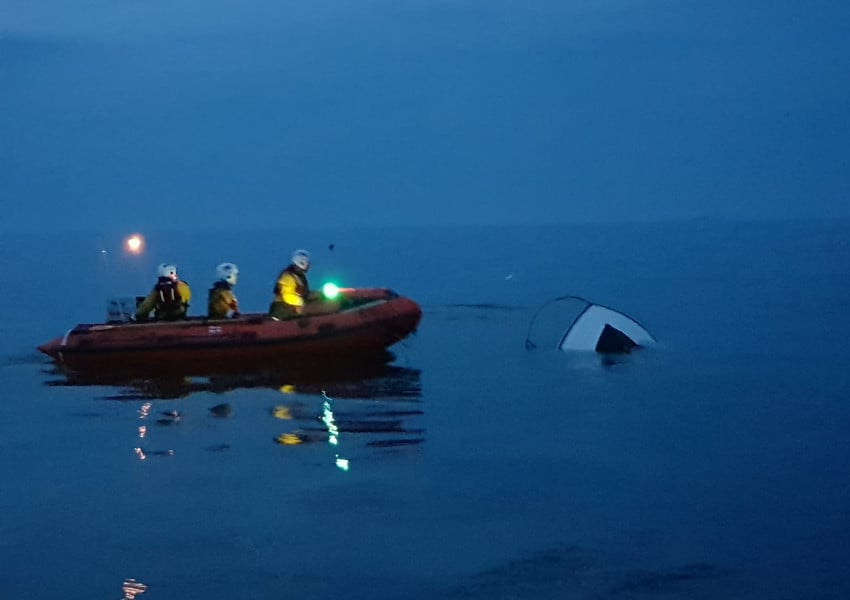
Later both lifeboats were requested to survey the casualty vessel to see if anything could be salvaged — but by then it was mostly submerged, as Larne RNLI reports.
Earlier in this Bank Holiday weekend for Northern Ireland, Kilkeel RNLI launched late on Friday (23 August) to attend a 10m yacht with two on board which had become stranded with a rope in the propeller.
Kilkee RNLI says the volunteer crew located the yacht Villa Vilja — which was on passage from Tromso, Norway to the Caribbean — seven miles north-east of Kilkeel in freshening conditions.
And with the yacht tossing about in the rough seas, the lifeboat helm brought the lifeboat safely aside and a crew member boarded the yacht to check all was well to establish a tow.
Despite the challenging conditions, the yacht was brought safely into Kilkeel Harbour where the local coastguard team ensured it was safely and securely berthed at the pontoon.
Kilkeel RNLI lifeboat operations manager John Fisher said: “The transfer of a crew member to another vessel is a manoeuvre the crew often practice but with both boats being tossed about, the transfer was particularly difficult — but was managed, as usual, in a very safe professional manner and we wish the sailors a safe onward passage to the Caribbean.”



























